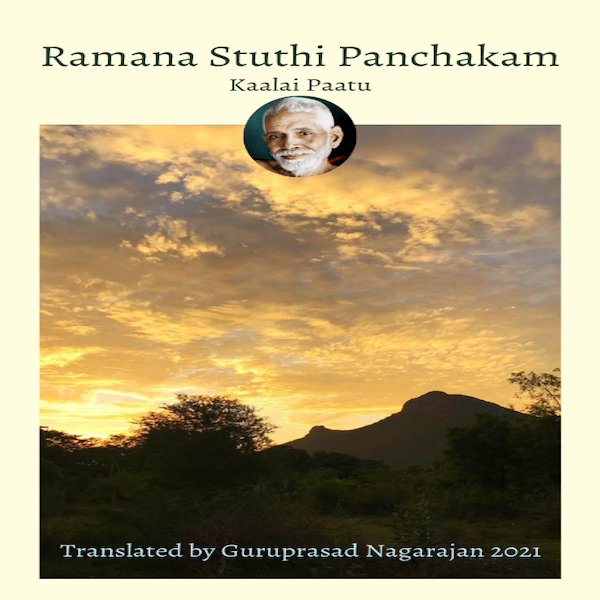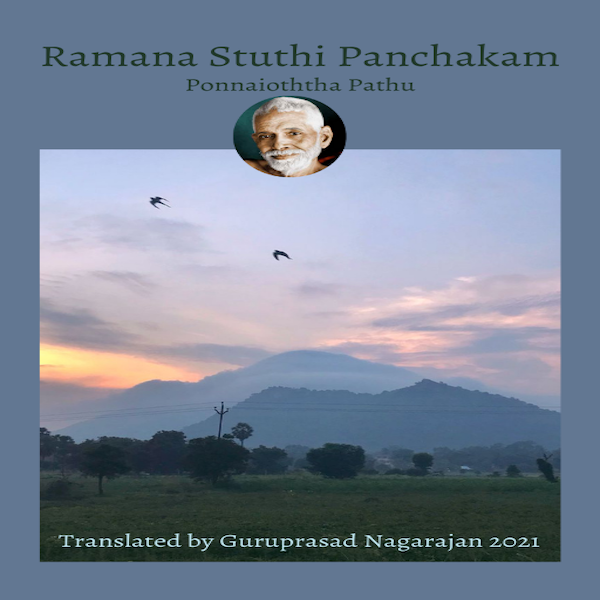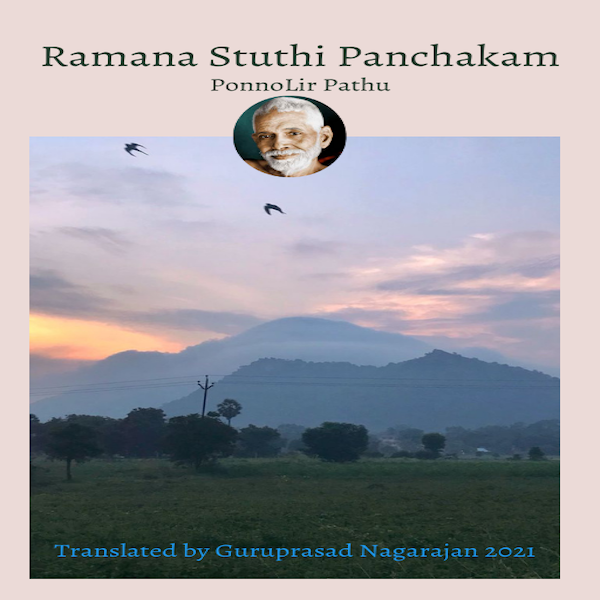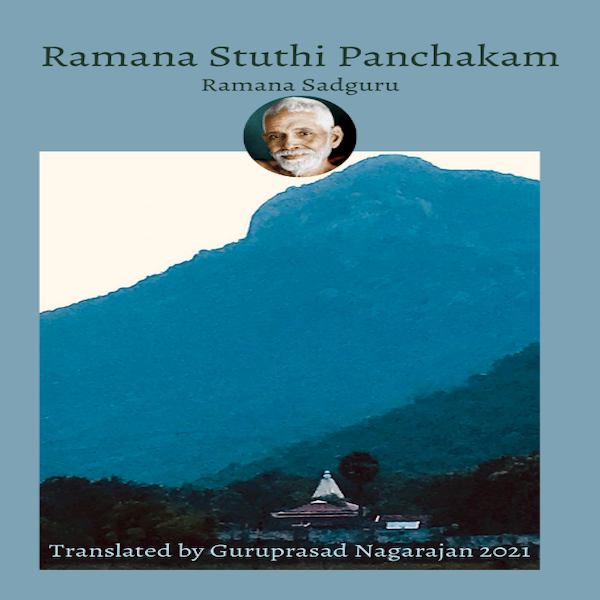Angameri agan karithidu
MaaNava padu paaviyai;
Thunga gnana vaaL kondu saaduveer
ThoomaNi chudar aagineer.
Word meaning
Angam = body; agam = mind/heart; arithudum = eat away at; aaNavam = ego; padu paavi = worst sinner; vaaL = sword; thoomaNi (thooya maNi) = pure gem-like; chudar = flame/light.
Meaning
Oh Ramana, you who are pure precious light! Chop off this sinner who has fallen prey to the ego that mistakenly makes me think this body is me.
Rooting out the ego is the first request in Bhagavan’s Aksharamanamalai as it is the I thought that is responsible for all the we enjoy and suffer, which makes us take the body to be real and makes us go through the consequent sorrows and troubles.
AruNachalam ena agame niniappavar
agathai ver aruppai Arunachala
Meaning
O Arunachala! Destroy the ego by its roots of devotees who merely think of the name Arunachala.
Explanation
Arunachala, you destroy the ego which deludes us into thinking we are separate from you. ‘Arunachalam ena agame ninaippavar’ means thinking of Arunachala must not be superficial but must be from the heart. Bhagavan recommends Ananya bhavam instead of Anya Bhavam. Anya means to see something as separate from oneself. Ananya is to transcend the difference.
Ramanatha Brahmachari, one Bhagavan’s earliest devotees, in his song, ‘Thiruchuzhinadhanai kandane’ using a similar imagery of ego being cut off by Bhagavan’s sword:
‘… Jiva was ruling unjustly in the town of Kayapuri (the body) with the karanas (the sense organs and the organs of action) as his subjects and ahankara (the ego) as his minister. After some time, jiva took up the sword of God‟s grace and cut off the head of his minister, ahankara …’ (ahankara = ahah kara = literally ‘I’maker). There are two things we are supposed to give up, ahankara and mamakara (me and mine) on the path to raising the truth according to scriptures. (From Ramana Periyapuranam)
Ellam Ondre challenges the ego thus:
Oh ego, all the evils of the world are from you. To crush you, the kings
make laws and the wise give lessons. In spite of their efforts from time
immemorial, alas! you are yet alive; you simply go into hiding and
reappear again and again.
Bhagavan, in Dialogues II says:
Killing the ego is not an easy thing. It is only when God Himself by His Grace draws the mind inwards that complete surrender can be achieved. But such grace comes only to those who have already, in this or previous lives, gone through all the struggles and sadhanas preparatory to the extinction of the mind and killing of the ego.”
It is with the grace of Bhagavan that we can hope to kill the ego and transcend its tyranny over us. While we do that, we can take heart from the following exchange:
Somebody asked Bhagavan, ‘We have met at your feet, all of us. Was it our good luck, or is there a link between us from our previous births?’ Bhagavan replied in a quite matter-of-fact way: ‘Were it not for the old links, how could you all have come here?’ (From Devotees Book 4, Page 241).
(Padupaavi means worst sinner. ‘padu’ acts as a measure of degree/qualifier, usually negative in nature, for example, ‘padu kuzhi’ means a deep ravine, ‘padu mosam’ means very bad.)
MaaNava padu paaviyai;
Thunga gnana vaaL kondu saaduveer
ThoomaNi chudar aagineer.
Word meaning
Angam = body; agam = mind/heart; arithudum = eat away at; aaNavam = ego; padu paavi = worst sinner; vaaL = sword; thoomaNi (thooya maNi) = pure gem-like; chudar = flame/light.
Meaning
Oh Ramana, you who are pure precious light! Chop off this sinner who has fallen prey to the ego that mistakenly makes me think this body is me.
Rooting out the ego is the first request in Bhagavan’s Aksharamanamalai as it is the I thought that is responsible for all the we enjoy and suffer, which makes us take the body to be real and makes us go through the consequent sorrows and troubles.
AruNachalam ena agame niniappavar
agathai ver aruppai Arunachala
Meaning
O Arunachala! Destroy the ego by its roots of devotees who merely think of the name Arunachala.
Explanation
Arunachala, you destroy the ego which deludes us into thinking we are separate from you. ‘Arunachalam ena agame ninaippavar’ means thinking of Arunachala must not be superficial but must be from the heart. Bhagavan recommends Ananya bhavam instead of Anya Bhavam. Anya means to see something as separate from oneself. Ananya is to transcend the difference.
Ramanatha Brahmachari, one Bhagavan’s earliest devotees, in his song, ‘Thiruchuzhinadhanai kandane’ using a similar imagery of ego being cut off by Bhagavan’s sword:
‘… Jiva was ruling unjustly in the town of Kayapuri (the body) with the karanas (the sense organs and the organs of action) as his subjects and ahankara (the ego) as his minister. After some time, jiva took up the sword of God‟s grace and cut off the head of his minister, ahankara …’ (ahankara = ahah kara = literally ‘I’maker). There are two things we are supposed to give up, ahankara and mamakara (me and mine) on the path to raising the truth according to scriptures. (From Ramana Periyapuranam)
Ellam Ondre challenges the ego thus:
Oh ego, all the evils of the world are from you. To crush you, the kings
make laws and the wise give lessons. In spite of their efforts from time
immemorial, alas! you are yet alive; you simply go into hiding and
reappear again and again.
Bhagavan, in Dialogues II says:
Killing the ego is not an easy thing. It is only when God Himself by His Grace draws the mind inwards that complete surrender can be achieved. But such grace comes only to those who have already, in this or previous lives, gone through all the struggles and sadhanas preparatory to the extinction of the mind and killing of the ego.”
It is with the grace of Bhagavan that we can hope to kill the ego and transcend its tyranny over us. While we do that, we can take heart from the following exchange:
Somebody asked Bhagavan, ‘We have met at your feet, all of us. Was it our good luck, or is there a link between us from our previous births?’ Bhagavan replied in a quite matter-of-fact way: ‘Were it not for the old links, how could you all have come here?’ (From Devotees Book 4, Page 241).
(Padupaavi means worst sinner. ‘padu’ acts as a measure of degree/qualifier, usually negative in nature, for example, ‘padu kuzhi’ means a deep ravine, ‘padu mosam’ means very bad.)







 RSS Feed
RSS Feed